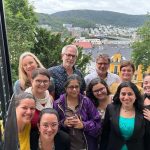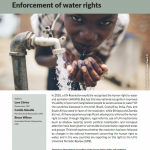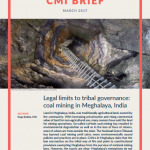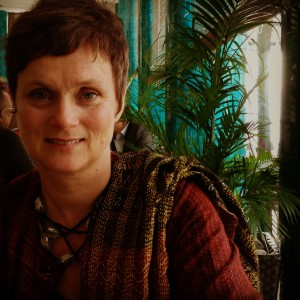 Siri Gloppen is Director at the Centre of Law and Social Transformation. Political scientist with a research focus in the intersection between law and politics. Siri Gloppen is Professor of Comparative Politics at the University of Bergen. With a research focus in the intersection between law and politics her work spans: legal mobilization and the role of courts in social transformation, democratization and institutionalization of accountability structures, constitution-making, election processes, human rights, transitional justice and reconciliation. Main empirical focus is southern and eastern Africa.
Siri Gloppen is Director at the Centre of Law and Social Transformation. Political scientist with a research focus in the intersection between law and politics. Siri Gloppen is Professor of Comparative Politics at the University of Bergen. With a research focus in the intersection between law and politics her work spans: legal mobilization and the role of courts in social transformation, democratization and institutionalization of accountability structures, constitution-making, election processes, human rights, transitional justice and reconciliation. Main empirical focus is southern and eastern Africa.
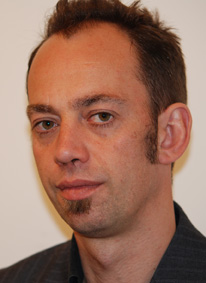 Malcolm Langford is Co-Director at the Centre of Law and Social Transformation and Senior Researcher at CMI. He is also a Visiting Fellow at Fridtjof Nansen Institute and the Co-Director of Global School on Socio-Economic Rights. He is also former Research Fellow at the Norwegian Centre for Human Rights and Director of the Socio-Economic Rights Programme. His recent publications include Socio-Economic Rights in South Africa: Symbols or Substance? (Cambridge University Press, Cambridge, 2014), edited with B. Cousins, J. Dugard and T. Madlingozi.
Malcolm Langford is Co-Director at the Centre of Law and Social Transformation and Senior Researcher at CMI. He is also a Visiting Fellow at Fridtjof Nansen Institute and the Co-Director of Global School on Socio-Economic Rights. He is also former Research Fellow at the Norwegian Centre for Human Rights and Director of the Socio-Economic Rights Programme. His recent publications include Socio-Economic Rights in South Africa: Symbols or Substance? (Cambridge University Press, Cambridge, 2014), edited with B. Cousins, J. Dugard and T. Madlingozi.
PhD-course Leaders:
 Camila Gianella (MSc, PhD) is a researcher at CMI and a post doctoral fellow at the department of Comparative Politics, University of Bergen in the project Sexual and Reproductive Rights (SRR) Lawfare: Global battles over sexual and reproductive rights, driving forces and impacts, Dr. Gianella is also part of the team of two related project: Abortion Rights lawfare in Latin America and International Sexual and Reproductive Rights Lawfare. Gianella has a PhD from the University of Bergen. In her dissertation she analyzed the process of implementation of a structural court decision from the Colombian Constitutional Court which asked for major reforms within the health system. Prior to her PhD from the University of Bergen, Camila worked as researcher and consultant for projects on maternal health, the right to health, HIV/AIDS, tuberculosis, mental health and transitional justice.
Camila Gianella (MSc, PhD) is a researcher at CMI and a post doctoral fellow at the department of Comparative Politics, University of Bergen in the project Sexual and Reproductive Rights (SRR) Lawfare: Global battles over sexual and reproductive rights, driving forces and impacts, Dr. Gianella is also part of the team of two related project: Abortion Rights lawfare in Latin America and International Sexual and Reproductive Rights Lawfare. Gianella has a PhD from the University of Bergen. In her dissertation she analyzed the process of implementation of a structural court decision from the Colombian Constitutional Court which asked for major reforms within the health system. Prior to her PhD from the University of Bergen, Camila worked as researcher and consultant for projects on maternal health, the right to health, HIV/AIDS, tuberculosis, mental health and transitional justice.
 Bruce M. Wilson (Ph.D. Washington University) is Professor of Political Science at the University of Central Florida, Orlando, Florida and Associated Senior Researcher at the Chr. Michelsen Institute, Bergen, Norway. His research on Latin American politics and comparative judicial politics has appeared in numerous peer-reviewed journals including Comparative Political Studies, the Journal of Latin American Studies, Comparative Politics, Journal of Politics in Latin America, and the International Journal of Constitutional Law. His books include, Costa Rica: Politics, Economics, and Democracy (1998) and a co-authored book, Courts and Political Power in Latin America and Africa (2010). He is former editor of The Latin Americanist and is currently the co-editor of the Journal of Political Science Education.
Bruce M. Wilson (Ph.D. Washington University) is Professor of Political Science at the University of Central Florida, Orlando, Florida and Associated Senior Researcher at the Chr. Michelsen Institute, Bergen, Norway. His research on Latin American politics and comparative judicial politics has appeared in numerous peer-reviewed journals including Comparative Political Studies, the Journal of Latin American Studies, Comparative Politics, Journal of Politics in Latin America, and the International Journal of Constitutional Law. His books include, Costa Rica: Politics, Economics, and Democracy (1998) and a co-authored book, Courts and Political Power in Latin America and Africa (2010). He is former editor of The Latin Americanist and is currently the co-editor of the Journal of Political Science Education.
Bergen Exchanges Participants:
 Marja Hinfelaar is the Director of Research and Programs at the Southern African Institute for Policy and Research (www.saipar.org) where, among other activities, she coordinates a PhD affiliation program, the Cornell University Summer School, the Zambia Legal Information Institute (www.zambialii.org) and leader researcher on various research projects.She has been a resident in Zambia since 1997. Marja Hinfelaar received her PhD in History in 2001 from the University of Utrecht, the Netherlands, where her dissertation focused on the history of women’s organisations in Zimbabwe. She is the co-editor of One Zambia, many Histories. Towards a History of Post-colonial Zambia (Brill, Leiden 2008), Living the End of Empire. Politics and Society in Late Colonial Zambia (Brill, Leiden, 2011), The Objects of Life in Central Africa: The History of Consumption and Social Change, 1840-1980 (Brill, Leiden, 2013). For 10 years, she was the coordinator of digitization projects, based at the National Archives of Zambia. In addition, Marja is a political analyst, having published on the 2008 elections in Zambia in African Affairs and co-editor of a forthcoming book on Zambia’s elections. She is Member of Advisory Board of the Journal of Southern African Studies (JSAS).
Marja Hinfelaar is the Director of Research and Programs at the Southern African Institute for Policy and Research (www.saipar.org) where, among other activities, she coordinates a PhD affiliation program, the Cornell University Summer School, the Zambia Legal Information Institute (www.zambialii.org) and leader researcher on various research projects.She has been a resident in Zambia since 1997. Marja Hinfelaar received her PhD in History in 2001 from the University of Utrecht, the Netherlands, where her dissertation focused on the history of women’s organisations in Zimbabwe. She is the co-editor of One Zambia, many Histories. Towards a History of Post-colonial Zambia (Brill, Leiden 2008), Living the End of Empire. Politics and Society in Late Colonial Zambia (Brill, Leiden, 2011), The Objects of Life in Central Africa: The History of Consumption and Social Change, 1840-1980 (Brill, Leiden, 2013). For 10 years, she was the coordinator of digitization projects, based at the National Archives of Zambia. In addition, Marja is a political analyst, having published on the 2008 elections in Zambia in African Affairs and co-editor of a forthcoming book on Zambia’s elections. She is Member of Advisory Board of the Journal of Southern African Studies (JSAS).
 Mindy Jane Roseman is Director of the Gruber Program for Global Justice and Women’s Rights, as well as the Director of International Law Programs at Yale Law School. She was the Academic Director of the Human Rights Program and a Lecturer on Law at Harvard Law School. Before joining HRP, Roseman was an Instructor in the Department of Population and International Health at Harvard School of Public Health Roseman researched and reported on a range of health and human rights issues, with special focus on reproductive and sexual rights, including HIV and AIDS, and women’s and children’s rights. Before coming to Harvard she had been a staff attorney with the Center for Reproductive Rights in New York, in charge of its East and Central European program. She also holds a J.D. from Northwestern Law School and a Ph.D. in Modern European History, with a focus on the history of reproductive health, from Columbia University. Her publications include Reproductive Health and Human Rights: The Way Forward (Laura Reichenbach, co-editor),Interrogations, Forced Feedings and the Role of Health Professionals (co-edited with Ryan Goodman, Harvard University Press 2009) and Women of the World (East Central Europe): Laws and Policies Affecting Their Reproductive Lives (CRLP, 2000). A co-authored article “”International human rights and the mistreatment of women during childbirth,” was published in Health and Human Rights, 18(2) (2016). She is currently co-editing a volume “Beyond Virtue and Vice: the Criminalization of Gender, Sexuality and Reproduction in the Age of Human Rights” with Alice Miller (forthcoming 2018 University of Pennsylvania Press).
Mindy Jane Roseman is Director of the Gruber Program for Global Justice and Women’s Rights, as well as the Director of International Law Programs at Yale Law School. She was the Academic Director of the Human Rights Program and a Lecturer on Law at Harvard Law School. Before joining HRP, Roseman was an Instructor in the Department of Population and International Health at Harvard School of Public Health Roseman researched and reported on a range of health and human rights issues, with special focus on reproductive and sexual rights, including HIV and AIDS, and women’s and children’s rights. Before coming to Harvard she had been a staff attorney with the Center for Reproductive Rights in New York, in charge of its East and Central European program. She also holds a J.D. from Northwestern Law School and a Ph.D. in Modern European History, with a focus on the history of reproductive health, from Columbia University. Her publications include Reproductive Health and Human Rights: The Way Forward (Laura Reichenbach, co-editor),Interrogations, Forced Feedings and the Role of Health Professionals (co-edited with Ryan Goodman, Harvard University Press 2009) and Women of the World (East Central Europe): Laws and Policies Affecting Their Reproductive Lives (CRLP, 2000). A co-authored article “”International human rights and the mistreatment of women during childbirth,” was published in Health and Human Rights, 18(2) (2016). She is currently co-editing a volume “Beyond Virtue and Vice: the Criminalization of Gender, Sexuality and Reproduction in the Age of Human Rights” with Alice Miller (forthcoming 2018 University of Pennsylvania Press).
 Thomas M. Keck is the Michael O. Sawyer Chair of Constitutional Law and Politics at Syracuse University’s Maxwell School of Citizenship and Public Affairs. He received a B.A. in Politics from Oberlin College and an M.A. and Ph.D. in Political Science from Rutgers University. His research focuses on constitutional courts and the use of legal strategies by contemporary political movements on the left and the right. He is the author of The Most Activist Supreme Court in History (2004) and Judicial Politics in Polarized Times (2014), and is currently leading a long-term, collaborative investigation of free speech jurisprudence in democratic and democratizing countries around the globe, funded by the National Science Foundation.
Thomas M. Keck is the Michael O. Sawyer Chair of Constitutional Law and Politics at Syracuse University’s Maxwell School of Citizenship and Public Affairs. He received a B.A. in Politics from Oberlin College and an M.A. and Ph.D. in Political Science from Rutgers University. His research focuses on constitutional courts and the use of legal strategies by contemporary political movements on the left and the right. He is the author of The Most Activist Supreme Court in History (2004) and Judicial Politics in Polarized Times (2014), and is currently leading a long-term, collaborative investigation of free speech jurisprudence in democratic and democratizing countries around the globe, funded by the National Science Foundation.

Nicolas van de Walle is the Maxwell M. Upson Professor of Government at Cornell University in Ithaca, New York. He taught at Michigan State University from 1990-2004. He was a Non-Resident Fellow at the Center for Global Development from 2001 – 2012, and before that, from 1994-2000 a Fellow at the Overseas Development Council, in Washington DC. He has published widely on democratization issues as well as on the politics of economic reform and on the effectiveness of foreign aid, with a special focus on Sub Saharan Africa. His books include Democratic Trajectories in Africa: Unraveling the Impact of Foreign Aid, (2013, with Danielle Resnick), Overcoming Stagnation in Aid-Dependent Countries (2005), African Economies and The Politics of Permanent Crisis, 1979-1999 (2001), and Democratic Experiments in Africa: Regime Transitions in Comparative Perspectives (1997, with Michael Bratton).

